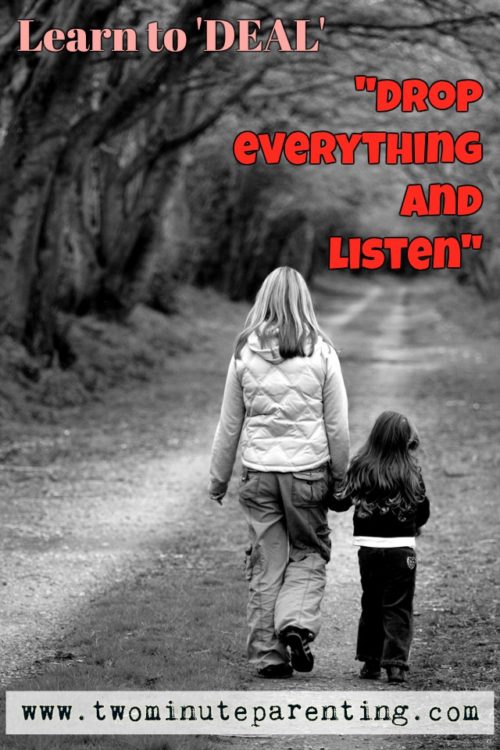When you have toddlers or pre-schoolers, you are always telling them to be quiet and stop talking. The children at that age are like non-stop batteries, talking endlessly making you laugh and wonder at the same time. They are running after us, not letting us sit, sleep or watch anything. They have to share it all. But once they start to cross the first decade of their life, the whole dynamics change. All that sharing about whatever happened in school or playground stops and we have to poke, ask and run after them to know all that is happening in their lives. The good part is that it happens to almost everyone and is perfectly normal. The difficult part is that you as a parent now have to put in extra effort to communicate and let them know that you are there.
Here ‘how you’ve been responding to their overtures all the initial years is going to help decide how close your relationship in terms of ‘sharing it all’ will be.’ Building a relationship takes time and effort and the same holds true for your child and your relationship as well. So if you are finding it difficult to reach out to your elusive child or teenager, read on the pointers we’ve brought for you. We are sure you’ll find more than one way to connect with them again…
1. Figure out a good time for both of you to talk
Children have a lot to share just after they return from school. While the events are still ripe in their memory they need to pass it on to someone as soon as they can and it is very likely that they will share it with the person they find at home. But are they likely to do it if the person at the other end is judgemental, preachy?
Communication is a two way process. And you have to make your children feel important by not only taking interest but also by being willing to be available and not being didactic. A lot of parents only try to find ways to steer conversation to a moral lesson. Every time you do that, you discourage them further from sharing things with you. If you must give feedback, wait for an appropriate time when you can choose your words carefully. Impulsive and instant feedback can do more harm than good. Understand that your effort in having an effective communication every time where he can talk freely will help you build a long term fulfilling relationship with your child.
It can be 15-20 minutes before the bed time or when they are back from the play ground in the evening or when you are in the car together. The tip is whenever they want to share, DEAL with it. (Drop Everything And Listen). Their emotions are giving them a hard time. They are not able to understand this world and a few people. They are struggling with their friends or peer group, their studies are getting difficult everyday. It is always good to have someone who understands their challenges. Be one. You’d not regret it!
2. Ask Specific and open-ended questions

Generic questions like ‘How was the day?’ or ‘How was school?’ are too broad to cover and sometimes the child is not sure where to start or what all to tell. Most likely if they are in a bad mood, they will avoid sharing by giving one word answer i.e. ‘It was bad.’ And the conversation will end there.
So try to be more specific. If they had a game at school, ask them how it was? Who scored the goal or how was it different from last time? Ask them if their teacher said something they didn’t know or if something funny happened in the class? “What did you play in the recess today?’ or ‘Who are you sitting with this week and if they are liking it better than last week?’ ‘Being specific and asking open ended questions is the key.’
General questions are boring and are mostly used in social meetings, not at home with kids. Think about it, if someone asks you how are you in a party. You are not supposed to say,’I skipped my lunch and my meeting was pretty bad.’ In all probability, you’d say ‘I am fine, thanks’ and will move on. Similarly, the default questions like ‘How was your day?’ is close ended and will mostly give you one word answer.
Also read: From Angry And Cranky To Calm And Mindful: My Revelation As A Parent
3. Be non-judgemental and available
A lot of infatuations start at teenage or even earlier. It is imperative for a parent to know if your child has a crush on someone or if they have feelings for someone. At times, when things don’t go as planned, children don’t know how to cope up with heart breaks or a new relationship dynamic within the class. At all such times, if the child is close to the parents, the parents can share their own childhood stories, talk to them about how this happens to everyone and how it is alright to feel certain emotions and still not lose focus in the studies.
With teenagers, whether they’ll share with you also depends on your overall relationship. Invest in strengthening the relationship and building the trust for him/her to share their secrets, fears and dreams.
4. Learn to Listen even when not spoken to
A recent incident about a 13 year old girl sending her nude pictures to her boyfriend, which went viral, made me not only worried but also anxious about the damage technology can do to the children. this girl confessed only when things went out of control and school asked her to bring in her parents. When asked why she did it? She said that she was lonely and needed attention. Both the parents were working and she was alone all day in company of a nanny.
Now, this situation could’ve been avoided if she was constructively engaged or was communicating with the parents effectively. The worst part was that this girl was so depressed for almost two weeks and none of the parent noticed if something was wrong! Do you think communication could’ve avoided it? It may or may not, but it could’ve helped this girl cope up better with the damaging situation.
Listening is an integral part of communication. Learn to listen even when your children are not talking to you. Reach out to them if you feel they are depressed or are spending a lot of times alone.

5. Stay interested
As a parent you can’t communicate meaningfully unless you don’t really know what your child likes, listens to or watches. You may not necessarily do the same thing but it is important to know how and where do they spend their time. It is a good idea to sometime watch movies together or discuss a book that you’ve both read. When trying to communicate, don’t always go down nostalgia lane and tell how things were, when you were young, instead talk about the things they like- movies, TV shows, books, games or music. Try to be interested and stay interested.
If it seems that they are not sharing much, because of lack of time or some other problem, then take a break and go out for dinner or shopping, play a board game or watch a movie together. Make sure that you are available when your child wants to share something. When they tell you to sit with them and spend some time, know that they need it. Sometimes you might not get a response or you might be at the receiving end; understand that teenage emotions are difficult to deal with and sometimes all they need is a good talk or a tight hug.






